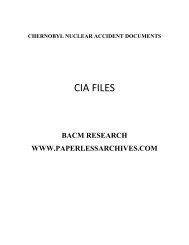national security agency journal articles world war ii german ...
national security agency journal articles world war ii german ...
national security agency journal articles world war ii german ...
Create successful ePaper yourself
Turn your PDF publications into a flip-book with our unique Google optimized e-Paper software.
UNCLASSIFIED<br />
of Ukrainians, White Russians, and Cossacks, were to<br />
some extent pro-German. This made penetration of<br />
enemy organizations by agents comparatively easy.<br />
Only SS stupidity and unwillingness to arrive at a<br />
political compromise with some of the anti-Soviet<br />
groups in Russia and Poland ruined this fertile ground<br />
for German espionage. In the West, on the other hand,<br />
the Germans were faced by solid blocks of hostile<br />
populations. England, favored by the insular character<br />
of the country, was a particularly difficult problem for<br />
agents. By 1944, France also had become almost<br />
solidly united against the Germans as a result of the<br />
short-sighted manner in which the Germans treated<br />
the French.<br />
Directing secret service work is, perhaps more than<br />
any other kind of intelligence work, largely a question<br />
of personalities. Many agents do not work directly for<br />
a cause, but are mercenaries working for the officer<br />
who hired them. Often they do not even realize what<br />
cause they are working for. This requires a great deal<br />
of personal skill and knowledge of psychology on the<br />
part of the directing officer. In addition he must have<br />
detailed and accurate knowledge of the enemy, of local<br />
conditions and habits, and of tactical situations. He<br />
must work relentlessly and have a love for anonymity.<br />
Altogether the German character, so easily given to<br />
illusions, romantic speculations, and spectacular deeds<br />
does not lend itself too well to secret work. In that<br />
sense, the Germans obviously did not have the right<br />
personalities available when the invasion started. It is<br />
quite typical that, in order to reinforce their organization<br />
in the West, the Germans brought, from an<br />
army group in the East, the experienced commander<br />
of a FAK, an officer who had never worked in the<br />
West, but who knew France. It is reported that this<br />
officer, although at first quite unfamiliar with local<br />
conditions, achieved more in two weeks than his<br />
predecessor had attained in six months.<br />
In the East, there was no continuous front line, and<br />
the employment of agents, their infiltration through<br />
the enemy lines, and their return were comparatively<br />
easy. In Italy, the long coastal stretches on both sides<br />
of the country favored the employment of agents, since<br />
they could enter and return from enemy occupied<br />
territory by water around either end of the front. In<br />
the West, however, more or less continuous front lines<br />
existed - at least during the static phase of the <strong>war</strong><br />
- that hampered the regularity of such movements.<br />
The Allied employment of agents in the West gave<br />
the Germans little indication of Allied intentions. In<br />
the East, -communications behind the front lines were<br />
exceedingly poor as compared to the West, and the<br />
Russians, in order to gain important data about the<br />
enemy for their next operations, had to send their<br />
agents directly into the region in which they were<br />
interested. In the West, there was no technical difficulty<br />
in sending agents to Holland with missions<br />
covering anything between the Ruhr and the French<br />
Alps. The place of capture, therefore, meant very<br />
little unless the exact mission of the man became<br />
known, so that intelligence obtained by counterespionage<br />
in the West could be used for operational purposes<br />
only in an extremely indirect manner.<br />
Concerning the organization of the secret service,<br />
one other point needs emphasis - the dual chain of<br />
command of the intelligence reconnaissance units. For<br />
formation, direction, and administration they were<br />
first under the Abwehr and later under the Military<br />
Office of the National Security Office. The tactical<br />
employment of these units, however, was a function of<br />
the chief intelligence officer at army group and army<br />
level. He never personally directed agents, and almost<br />
never saw an agent himself. He could give orders and<br />
designate objectives to the commanding officer of the<br />
FAK who, in turn, had to take the steps needed to<br />
achieve the results desired by the chief intelligence<br />
officer. To this extent - i.e., in having an agent<br />
organization over which the local commander had little<br />
or no control - the Germans suffered from the same<br />
disadvantages as the Allies.<br />
Channels<br />
Distrust of the specialist was the chief factor in the<br />
strict limitations set by German Army orders to<br />
intelligence channels. In practice there was more<br />
freedom than appeared. The chief fault, as far as can<br />
be ascertained, was that, while the intelligence channel<br />
was efficient in the for<strong>war</strong>ding of information (Foreign<br />
Armies in Berlin was informed of new identifications<br />
in a matter of hours), the channel was not so effective<br />
as a means of exchanging ideas. The extent to which<br />
the G-2 of a field unit could discuss with his superior<br />
G-2s the day's information, and thereby outline the<br />
enemy situation with them, was severely limited by<br />
the fact that he was required to submit his ideas to<br />
his G-3 or his chief of staff. The influence of these<br />
operations officers in intelligence matters was, by<br />
Allied standards, far too great; for, instead of having<br />
the differences in appreciation straightened out over<br />
the telephone between G-2s, the chief of staff and<br />
even the commander, came into such discussions much<br />
too often. The result of such a procedure was that the<br />
intelligence picture at the various echelons frequently<br />
differed. This had two negative results. First, it did<br />
not help to raise the prestige of the intelligence officer<br />
20 UNCLASSIFIED
















